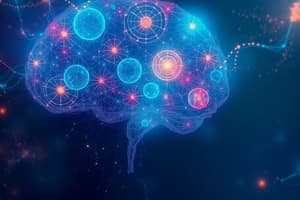Podcast
Questions and Answers
What are all the mental activities associated with thinking, knowing, remembering, and communicating?
What are all the mental activities associated with thinking, knowing, remembering, and communicating?
Cognition
What is thinking about thinking?
What is thinking about thinking?
Metacognition
What are the cognitive abilities and processes that allow humans to plan or inhibit their actions?
What are the cognitive abilities and processes that allow humans to plan or inhibit their actions?
Executive Functioning
What is a mental grouping of similar objects, events, ideas, or people?
What is a mental grouping of similar objects, events, ideas, or people?
What is a mental image or best example of a category?
What is a mental image or best example of a category?
What are concepts or mental frameworks that organize and interpret information?
What are concepts or mental frameworks that organize and interpret information?
What image or picture of the way space is organized as determined by an individual's perception, impression, and knowledge of that space?
What image or picture of the way space is organized as determined by an individual's perception, impression, and knowledge of that space?
What is a step-by-step procedure for solving a problem?
What is a step-by-step procedure for solving a problem?
What is a rule-of-thumb problem-solving strategy?
What is a rule-of-thumb problem-solving strategy?
What is estimating the likelihood of events based on their availability in memory; if instances come readily to mind (perhaps because of their vividness), we presume such events are common?
What is estimating the likelihood of events based on their availability in memory; if instances come readily to mind (perhaps because of their vividness), we presume such events are common?
What is judging the likelihood of things in terms of how well they seem to represent, or match, particular prototypes; may lead us to ignore other relevant information?
What is judging the likelihood of things in terms of how well they seem to represent, or match, particular prototypes; may lead us to ignore other relevant information?
What is the belief that the chances of something happening with a fixed probability become higher or lower as the process is repeated?
What is the belief that the chances of something happening with a fixed probability become higher or lower as the process is repeated?
What is a tendency to search for information that confirms one's preconceptions?
What is a tendency to search for information that confirms one's preconceptions?
What is clinging to one's initial conceptions after the basis on which they were formed has been discredited?
What is clinging to one's initial conceptions after the basis on which they were formed has been discredited?
What is the bias in which people's subjective confidence in their decision making is greater than their objective accuracy?
What is the bias in which people's subjective confidence in their decision making is greater than their objective accuracy?
What is a framing effect in which people make decisions about a current situation based on what they have previously invested in the situation?
What is a framing effect in which people make decisions about a current situation based on what they have previously invested in the situation?
What is a tendency to approach a problem in one particular way, often a way that has been successful in the past?
What is a tendency to approach a problem in one particular way, often a way that has been successful in the past?
What is the tendency to think of things only in terms of their usual functions; an impediment to problem solving?
What is the tendency to think of things only in terms of their usual functions; an impediment to problem solving?
What expands the number of possible problem solutions (creative thinking that diverges in different directions)?
What expands the number of possible problem solutions (creative thinking that diverges in different directions)?
What is a type of critical thinking in which one evaluates existing possible solutions to a problem to choose the best one?
What is a type of critical thinking in which one evaluates existing possible solutions to a problem to choose the best one?
What are Sternberg's 5 components of creative thinkers?
What are Sternberg's 5 components of creative thinkers?
What is a base of knowledge?
What is a base of knowledge?
What is seeing things in new ways?
What is seeing things in new ways?
What is focusing awareness on a narrowed range of stimuli or events?
What is focusing awareness on a narrowed range of stimuli or events?
What is the ability to focus on only one stimulus from among all sensory input?
What is the ability to focus on only one stimulus from among all sensory input?
What is surrounding self with other creative people?
What is surrounding self with other creative people?
What is driven by interest and passion rather than money or deadlines?
What is driven by interest and passion rather than money or deadlines?
What is the ability to concentrate on one voice amongst a crowd?
What is the ability to concentrate on one voice amongst a crowd?
What is the tendency to read the words instead of saying the color of ink?
What is the tendency to read the words instead of saying the color of ink?
When do we encode its sound?
When do we encode its sound?
What is thinking about the physical appearance of words to be learnt?
What is thinking about the physical appearance of words to be learnt?
What is thinking about the meaning of words to be learnt?
What is thinking about the meaning of words to be learnt?
What is encoding that requires attention and conscious effort?
What is encoding that requires attention and conscious effort?
What is the decision-making bias that results from the way a decision, question, or problem is worded?
What is the decision-making bias that results from the way a decision, question, or problem is worded?
What is turning sensory information into a form the brain can use?
What is turning sensory information into a form the brain can use?
What is holding onto information for some period of time (making a memory)?
What is holding onto information for some period of time (making a memory)?
What is getting information out storage?
What is getting information out storage?
What is a brief recording of sensory information before it is passed to short-term memory?
What is a brief recording of sensory information before it is passed to short-term memory?
What is visual sensory memory?
What is visual sensory memory?
What is auditory sensory memory?
What is auditory sensory memory?
What is a limited-capacity store that can maintain unrehearsed information for about 20 to 30 seconds. Can retain about 7 objects?
What is a limited-capacity store that can maintain unrehearsed information for about 20 to 30 seconds. Can retain about 7 objects?
What is the part of working memory that holds and processes verbal and auditory information?
What is the part of working memory that holds and processes verbal and auditory information?
What is the part of working memory that directs attention and processing?
What is the part of working memory that directs attention and processing?
What deals with/processes visual information?
What deals with/processes visual information?
What is the tendency for distributed study or practice to yield better long-term retention than is achieved through massed study or practice?
What is the tendency for distributed study or practice to yield better long-term retention than is achieved through massed study or practice?
What is the relatively permanent storage of information?
What is the relatively permanent storage of information?
What is knowledge HOW TO do something. (Procedural)
What is knowledge HOW TO do something. (Procedural)
What is writing that tells how to do something?
What is writing that tells how to do something?
What is memory of facts and experiences that one can consciously know and 'declare'?
What is memory of facts and experiences that one can consciously know and 'declare'?
What is knowing something is TRUE?
What is knowing something is TRUE?
What is a network of associated facts and concepts that make up our general knowledge of the world?
What is a network of associated facts and concepts that make up our general knowledge of the world?
What is the collection of past personal experiences that occurred at a particular time and place?
What is the collection of past personal experiences that occurred at a particular time and place?
What is remembering to do things in the future?
What is remembering to do things in the future?
What is the memory for events and facts related to one's personal life story?
What is the memory for events and facts related to one's personal life story?
What is seeking new experiences, tolerates the uncertain.
What is seeking new experiences, tolerates the uncertain.
What is Can yield short term results, but things are learned quickly are also forgetting quickly?
What is Can yield short term results, but things are learned quickly are also forgetting quickly?
What is Better to practice retrieval (test yourself) than just simply reading notes over and over.
What is Better to practice retrieval (test yourself) than just simply reading notes over and over.
Flashcards
Cognition
Cognition
All the mental activities associated with thinking, knowing, remembering, and communicating.
Metacognition
Metacognition
Thinking about thinking.
Executive Functioning
Executive Functioning
The cognitive abilities and processes that allow humans to plan or inhibit their actions.
Concept
Concept
Signup and view all the flashcards
Prototype
Prototype
Signup and view all the flashcards
Schemas
Schemas
Signup and view all the flashcards
Mental Maps
Mental Maps
Signup and view all the flashcards
Algorithm
Algorithm
Signup and view all the flashcards
Heuristic
Heuristic
Signup and view all the flashcards
Availability Heuristic
Availability Heuristic
Signup and view all the flashcards
Representativeness Heuristic
Representativeness Heuristic
Signup and view all the flashcards
Gambler's Fallacy
Gambler's Fallacy
Signup and view all the flashcards
Confirmation Bias
Confirmation Bias
Signup and view all the flashcards
Belief Perseverance
Belief Perseverance
Signup and view all the flashcards
Overconfidence Bias
Overconfidence Bias
Signup and view all the flashcards
Sunk-cost Fallacy
Sunk-cost Fallacy
Signup and view all the flashcards
Mental Set
Mental Set
Signup and view all the flashcards
Functional Fixedness
Functional Fixedness
Signup and view all the flashcards
Divergent Thinking
Divergent Thinking
Signup and view all the flashcards
Convergent Thinking
Convergent Thinking
Signup and view all the flashcards
Sternberg's 5 components of creative thinkers
Sternberg's 5 components of creative thinkers
Signup and view all the flashcards
Expertise
Expertise
Signup and view all the flashcards
Imaginative Thinking Skills
Imaginative Thinking Skills
Signup and view all the flashcards
Attention
Attention
Signup and view all the flashcards
Selective Attention
Selective Attention
Signup and view all the flashcards
Creative Environment
Creative Environment
Signup and view all the flashcards
Intrinsic Motivation
Intrinsic Motivation
Signup and view all the flashcards
Cocktail Party Effect
Cocktail Party Effect
Signup and view all the flashcards
Stroop Effect
Stroop Effect
Signup and view all the flashcards
Phonemic Processing
Phonemic Processing
Signup and view all the flashcards
Structural Processing
Structural Processing
Signup and view all the flashcards
Semantic Processing
Semantic Processing
Signup and view all the flashcards
Effortful Processing/Encoding
Effortful Processing/Encoding
Signup and view all the flashcards
Study Notes
Cognition, Memory, and Thinking
- Cognition encompasses all mental activities related to thinking, knowing, remembering, and communicating.
- Metacognition is thinking about thinking, a higher-order cognitive process.
- Executive functions involve planning and inhibiting actions.
- Concepts are mental groupings of similar objects, events, ideas, or people. Prototypes represent ideal examples of these categories. Schemas are mental frameworks for organizing information. Mental maps illustrate individuals' spatial understanding.
- Algorithms are step-by-step problem-solving procedures; heuristics are rules-of-thumb strategies. The availability heuristic estimates likelihood based on readily available memory examples; representativeness heuristic judges likelihood based on prototypes.
- The gambler's fallacy incorrectly assumes that probabilities change based on past events. Confirmation bias focuses on information confirming existing beliefs, while belief perseverance maintains beliefs despite contradictory evidence. The overconfidence bias leads to overestimating the accuracy of one's judgments, and the sunk-cost fallacy involves decisions based on past investments.
- Mental sets are tendencies to approach problems with past successful strategies, while functional fixedness limits problem-solving by focusing on objects' typical uses. Divergent thinking explores multiple solutions; convergent thinking evaluates options to find the best.
- Sternberg's five components of creative thinkers include expertise, imaginative thinking skills, a venturesome personality, intrinsic motivation, and a creative environment.
Memory Processes
- Sensory memory briefly holds sensory information before passing it to short-term memory, including iconic (visual) and echoic (auditory) memory.
- Short-term memory (STM) holds ≈ 7 items for about 20-30 seconds. Components include the phonological loop for verbal/auditory information and the central executive for directing attention and processing, along with the visuo-spatial scratchpad.
- Long-term memory (LTM) stores information permanently. Implicit (nondeclarative) memory concerns knowing how to do something (e.g., procedural). Explicit (declarative) memory includes knowing that something is true (semantic) or remembering personal experiences (episodic). Prospective memory involves remembering to do things in the future. Autobiographical memory encompasses personal experiences.
- Spacing effect shows that distributed study is better than massed study; the testing effect demonstrates the benefits of retrieval practice over simply rereading.
- Encoding turns sensory information into a usable format, storage is retaining this information, and retrieval is getting it back out.
Thinking and Problem-Solving Bias
-
The framing effect is how a question's wording influences decisions.
-
Mass practice (cramming) provides short-term results but is quickly forgotten. The cocktail party effect illustrates our ability to focus on one important stimulus among many. The Stroop effect highlights the difficulty ignoring automatic processes (like reading words).
-
Phonemic processing focuses on the sound of words.
-
Structural processing emphasizes the physical characteristics of words.
-
Semantic processing centers on understanding word meanings.
-
Effortful processing/encoding requires attention and conscious effort.
Studying That Suits You
Use AI to generate personalized quizzes and flashcards to suit your learning preferences.




